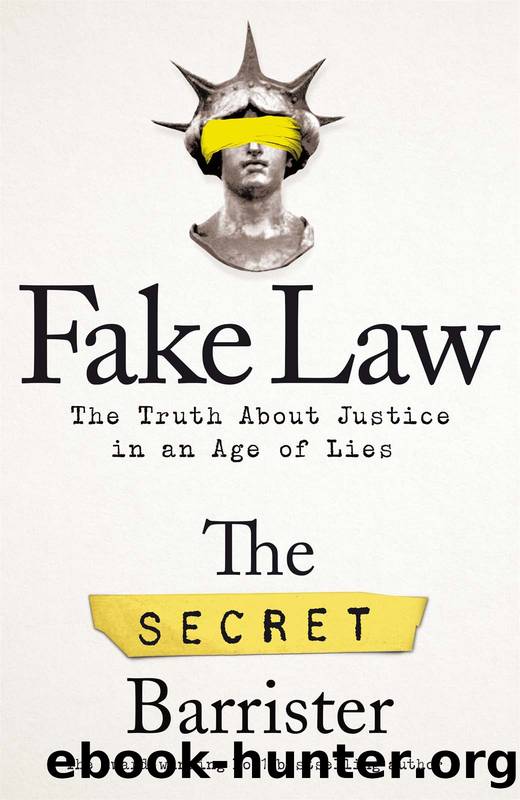Fake Law by The Secret Barrister

Author:The Secret Barrister
Language: eng
Format: epub
Publisher: Pan Macmillan UK
7. Our Liberty
In this chapter, I want to talk about my particular area of daily practice – criminal justice. For those who have read The Secret Barrister: Stories of the Law and How It’s Broken, the territory trodden may have a familiar feel, but the focus here is different. Rather than concentrating on how criminal justice works (or doesn’t work) in practice, over the following pages we will look at the way in which we discuss criminal justice, and the stories we tell ourselves – and are told by our betters – about who it is for.
For crime, perhaps more than any other area of law, is something on which almost everybody has a strong opinion. And it is understandable why the subject of criminal justice often provokes such heightened, visceral responses. Criminal offences are the most serious and most affecting breaches of our legal code. At the highest end, they force us to confront unimaginable truths about what we are capable of doing to each other. Even at the lowest end, crimes by their very nature represent such grave wrongdoings against the rights of others or society that the state cannot stand by. It is not enough to – as we do with the civil law – signpost the wronged party in the direction of a courtroom and invite them to assume the responsibility and cost of litigation, if they feel strongly enough about seeking redress. Instead, the state swoops in to remove the dispute from the citizens and feed it through the machinery of the criminal justice system. Private citizens retain a role, as a complainant and/or witness, but their pain and suffering is municipalised; the case passes into public ownership as a transgression not just against one, but against us all. The prosecutor is not an individual, but the Crown. Contrary to popular myth, the injured party does not decide whether to ‘press charges’; the decision whether to prosecute rests with Her Majesty’s Constabulary and the Crown Prosecution Service.1
We all have a stake in criminal justice. And, even if we are fortunate enough to have evaded its direct icy grasp, we can immediately empathise with those who are rendered victims. When we read those awful stories of harm, suffering and loss writ large, we put ourselves or our loved ones in the victim’s shoes. We dare to contemplate, even if for a second, that it was our child who was hurt, our home that was burgled, our spouse who was killed by that driver.
By contrast, it is rare that, when a story about a criminal case breaks, our thoughts – much less our sympathies – lie with the accused. That side of the criminal justice coin does not recommend itself to us as immediately. Nobody likes to imagine, much less plans, that they will be accused of a crime. Such fates befall other people – people who invite the attentions of the state. People who deserve it.
As a result, there is, I worry, a tendency in how
Download
This site does not store any files on its server. We only index and link to content provided by other sites. Please contact the content providers to delete copyright contents if any and email us, we'll remove relevant links or contents immediately.
People We Meet on Vacation by Emily Henry(4300)
Her Soul to Take (Souls Trilogy) by Harley Laroux(2528)
One Last Stop by Casey McQuiston(2302)
Vow of Deception: A Dark Marriage Romance (Deception Trilogy Book 1) by Rina Kent(2108)
OFF-LIMITS WOMEN! (20 ROUGH, SCREAMING HOT TABOO EROTICA SEX STORIES FOR ADULTS) by Kelsie Spits(1962)
The Soulmate Equation by Christina Lauren(1932)
Undercover Threat by Sharon Dunn(1780)
An Offer From a Gentleman: The Epilogue II by Julia Quinn(1774)
Layla by Colleen Hoover(1721)
Migrations by Charlotte McConaghy(1673)
Heart Bones by Hoover Colleen(1659)
Ruthless Creatures: A Billionaire Romance (Queens & Monsters Book 1) by J.T. Geissinger(1594)
The Affair by Danielle Steel(1578)
Taboo Smut! by Jennifer Trapped(1572)
Romancing Mr. Bridgerton (Bridgerton 04) by Julia Quinn(1533)
Family Seduce - Dirty Adult Taboo Collection Of Arousing Erotic Short Hot Stories by Brandt Bella(1528)
Garden of Hope by Daphne Bloom(1520)
NAUGHTY SINGLE MOM NEXT DOOR: 12+ Rough Erotica Sex Stories For Adults (Mega Bundle) by Sarah Clamps(1503)
Life's Too Short by Abby Jimenez(1439)
